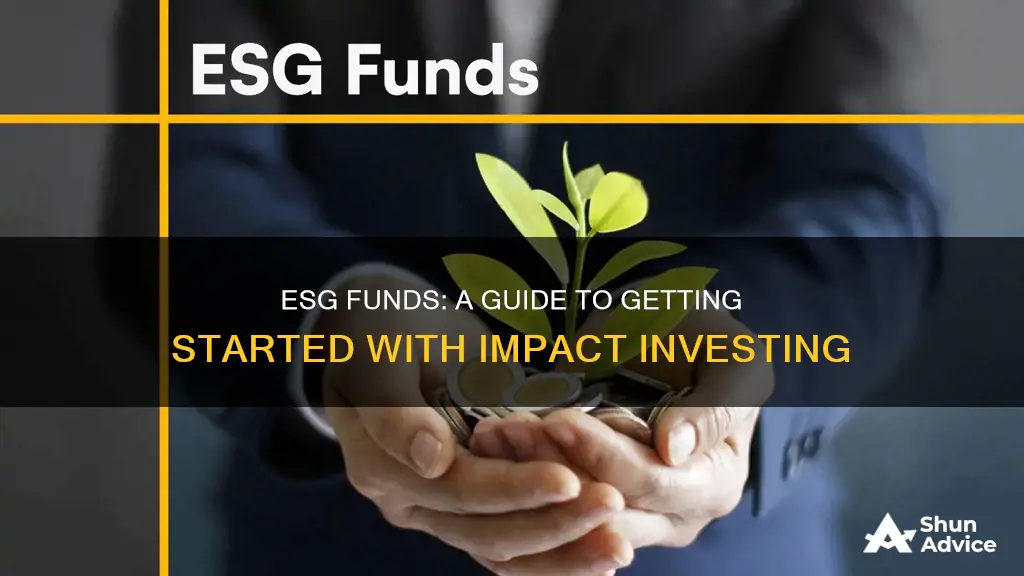
Environmental, social, and governance (ESG) funds are portfolios of equities and/or bonds that have passed stringent tests on how sustainable the company or government is regarding its ESG criteria. These funds are growing in popularity among investors who want to contribute to cutting global warming and adding to human development without compromising on financial returns. To invest in ESG funds, you need to choose an investment platform, typically an online brokerage account, and then research and select the ESG funds that fit your criteria.
What You'll Learn

Compare top ESG investing platforms
When comparing top ESG investing platforms, it's important to consider the specific needs and goals of an investor, as well as their values and the impact they want to have. Here's a look at some of the leading platforms in the market:
Bloomberg ESG
Bloomberg is a trusted source of corporate news and insights, and has been a leader in financial market data for over 40 years. Its ESG platform provides comprehensive data to help companies make more sustainable decisions and anticipate commercial risks and environmental gains. Bloomberg's analysis covers at least 80% of a company's operations and workforce, as well as 93% of the global equity market capitalisation.
Refinitiv
Refinitiv provides auditable ESG data to its clients, leveraging its own ESG scoring mechanism and publicly reported data. It offers an objective measurement of performance, commitment, and effectiveness across 10 main themes, including emissions, environmental product innovation, human rights, and shareholders.
Morningstar Sustainalytics
Morningstar is a global leader in the ESG domain, offering research, ratings, and data. Its Sustainalytics platform caters mainly to institutional entities, providing analytical insights into the sustainable aspects of businesses. With over 13,000 corporate ESG ratings and scores, the platform helps asset managers identify sustainable investment opportunities and detect greenwashing.
MSCI ESG Ratings
MSCI ESG Ratings is an essential tool for measuring a company's management of financially significant ESG risks and opportunities. It offers insights into multiple asset classes, gauging a company's resilience to pertinent risks in their ESG agenda. The public ESG Ratings & Climate corporate search tool provides access to ratings for over 2,900 companies in the MSCI All Country World Index (ACWI).
SustainIQ
SustainIQ is an award-winning platform designed specifically for sustainability and ESG. It offers a holistic approach by integrating reporting across four critical pillars, enabling real-time assessment. The platform is customisable and priced to suit specific company needs.
TruValue Labs
TruValue Labs harnesses the power of artificial intelligence to amplify research, analysis, and monitoring. By integrating ESG with technology and finance, the company aims to revolutionise how companies interact with data and enhance their insights. Their AI-driven tools offer a competitive edge in a rapidly evolving investment landscape governed by ESG criteria.
CSRHub
CSRHub is a platform that specialises in big data solutions for ESG and corporate social responsibility (CSR). It offers consensus ESG ratings and comprehensive insights into the sustainability profiles of private and public companies. With over 16,000 users, CSRHub serves investors, sustainability analysts, and corporations in understanding their sustainability footprints.
OneTrust
OneTrust, established in 2016, offers a suite of tools to help companies gain insight into risk management, policy, and compliance processes related to ESG. By uncovering patterns in data, it helps automate compliance workflows and supports firms in understanding how they can align with ESG principles.
UL Solutions
UL Solutions is a global leader in safety science, operating in 100 countries and offering software and testing for product innovation. Its UL 360 product for ESG data and analysis has proven effective in collecting, measuring, and reporting Scope 3 emissions data. UL Solutions has been recognised by Verdantix and Gartner for its performance in carbon management and CFO guide for financial ESG reporting software.
Diligent ESG
Diligent ESG is an advanced platform designed to streamline ESG data collection, benchmarking, and reporting. With a 93% user satisfaction rating, it amalgamates ESG data from various sources, supporting goal setting and other critical ESG initiatives. The platform ensures audit-ready documentation, making it valuable for companies seeking transparency and accountability through ESG reporting.
Trust Fund Investment Strategies: Where to Begin?
You may want to see also

Understand the basics
ESG stands for Environmental, Social, and Governance. ESG investing is a strategy for investors to support companies that meet specific parameters in these three areas.
In the environmental category, investors might look at a company's carbon footprint, climate impact, and natural resource conservation efforts. Social criteria include employee wellbeing, company health and safety track records, and labour standards. Finally, under governance, investors consider a company's accounting practices, business ethics, and board diversity.
ESG funds are portfolios of equities and/or bonds that have passed stringent tests on how sustainable a company or government is regarding its ESG criteria. An ESG investment product should contain only securities with a high sustainability score and would exclude companies with, for example, poor records on pollution, labour relations, or management practices.
Research has shown that the use of ESG in security selection leads to better-informed investment decisions, and that sustainability funds can perform better than non-sustainable ones. This is partly due to better risk management over contentious issues, as companies with lower carbon footprints, for example, face lower regulatory or societal risks.
ESG funds are growing in popularity among investors who want to contribute to cutting global warming and adding to human development, without compromising financial returns.
Thailand's Climate Investment Funds: A Historical Overview
You may want to see also

Understand your ESG criteria
Understanding your ESG criteria is a crucial step in the ESG investment process. This involves familiarising yourself with the range of criteria that fall under the umbrella of environmental, societal, and governance (ESG) factors.
ESG funds can be broad and inclusive of a wide range of companies that fit into the overarching environmental, social, or governance framework. For example, a company with a lower carbon footprint will face lower regulatory or societal risk than a polluter, and so its shares should be less volatile over time. Therefore, it is considered a better investment in terms of risk management.
However, some investors may prefer to focus on specific components of ESG investing, such as investing in companies that are actively working to lower carbon emissions, improve worker equity, promote gender diversity, or engage in ethical labour management.
Before investing, it is important to determine the lowest ESG score you will accept, and whether you are seeking a broad or targeted ESG fund, or prefer to screen for individual ESG companies. Most screeners assign a company an ESG score, typically on a five-point scale from one to five, based on how well the company fits within widely accepted ESG criteria.
It is also worth noting that there is no universally accepted definition or scoring method for ESG, and the score will vary by industry and reporting agency. As such, it is important to do your research and dig into the specific criteria used to evaluate companies to avoid "greenwashing".
Maximizing Cigna HSA Investment: A Guide to Smart Savings
You may want to see also

Research ESG investments
Once you've opened an online brokerage account, you can start researching ESG investments. There are two main approaches: self-directed investing and robo-advisors. With self-directed investing, you screen for and select your preferred ESG investments. Robo-advisors, on the other hand, are low-fee investment managers that offer various core and strategy portfolios based on your goals and risk tolerance levels.
Self-Directed ESG Investing
From your investment broker's research tab, access the screener for the type of asset (fund or individual stock) you're seeking. Select the criteria that you prefer, such as ESG score, fee level, market cap, industry, etc. You can then adjust the criteria and investigate the individual assets further to select the ones that meet your needs.
Robo-Advisor for ESG Investing
Robo-advisors are a good alternative for those who prefer a more hands-off approach. Most robo-advisors will ask about your age, financial goals, and risk tolerance. Based on your responses, the platform will recommend a specific asset allocation or mix of stock, bond, and alternative funds. For ESG investing, you can usually pick a broad ESG portfolio or one that offers the option to choose a specific ESG factor portfolio, such as climate or social impact. Some platforms, like Sustainfolio and Betterment, offer various types of ESG investing.
Types of ESG Investments
With the growing popularity of sustainable ESG investing, there are many types of ESG investments available. These include stocks, ETFs, and mutual funds. You can also choose between U.S. or international stocks or funds, or specific sectors such as healthcare or technology. ESG bond funds are also available.
Factors to Consider
When researching and selecting ESG investments, there are several factors to consider:
- Type or asset class of investment: Popular choices include stocks, ETFs, and mutual funds.
- Sector or industry: You can choose between U.S. or international stocks or funds, or specific sectors.
- ESG score: Scores typically range from one to five, and there is no right or wrong screening score. You may need to adjust the rating depending on the number of investments available.
- Fees: For fund investors, the annual expense ratio is an important consideration.
- Investment metrics: For stock pickers, you might look for low P/E ratio stocks, high momentum, revenue growth, low debt ratios, or other factors. For bond investors, consider credit quality or type of debt.
Vision Fund's WeWork Investment: A Bold Move?
You may want to see also

Choose an ESG investment
Once you've done your research and understand your ESG criteria, you can select your ESG investments. You can either choose the self-directed investing route or opt for a robo-advisor that offers ESG investments.
Self-directed ESG investing
Using the screener on your investment broker's platform, select the criteria that you prefer and choose the minimum acceptable ESG score. You can also add additional search criteria depending on your investment needs. For example, you might screen for a U.S. or international ESG equity fund and a specific fee level.
Robo-advisor for ESG investing
If you prefer a more hands-off approach, you can choose a robo-advisor platform. These platforms will ask you a few questions about your age, financial goals, and risk tolerance, and then recommend a specific asset allocation or mix of stock, bond, and alternative funds to meet your needs. You can pick either a broad ESG portfolio or one that offers the option to choose a specific ESG factor portfolio, such as climate or social impact. Some popular robo-advisor platforms for ESG investing include Sustainfolio and Betterment.
Smart Ways to Invest $20,000 in Mutual Funds
You may want to see also
Frequently asked questions
ESG stands for Environmental, Social, and Governance. ESG funds are portfolios of equities and/or bonds that have passed tests on how sustainable the company or government is regarding its ESG criteria.
ESG funds are growing in popularity among investors who want to contribute to cutting global warming and adding to human development, without compromising on financial returns. Research has shown that sustainability funds can perform better than non-sustainable ones, partly because of better risk management over contentious issues.
You will need to choose an investment platform, typically an online brokerage account. After opening and funding the account, you can visit the research section of the platform to screen for ESG investments.
Some popular ESG funds include Calvert Balanced A (CSIFX), iShares ESG MSCI EM ETF (ESGE), and SPDR MSCI EAFE Fossil Fuel Free ETF (EFAX).
When investing in ESG funds, it is important to consider the type or asset class of investment, the sector or industry, the ESG score, fees, and investment metrics.







